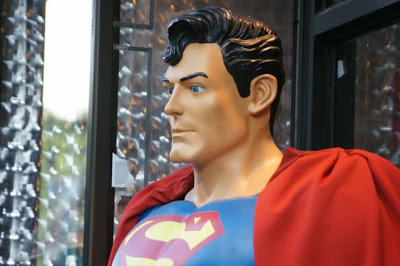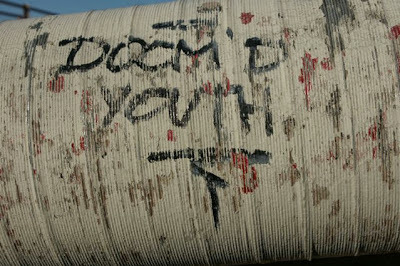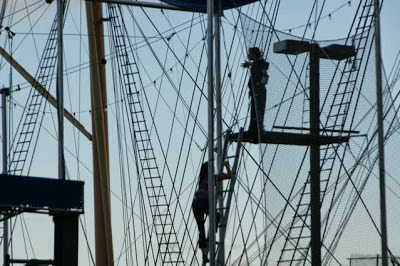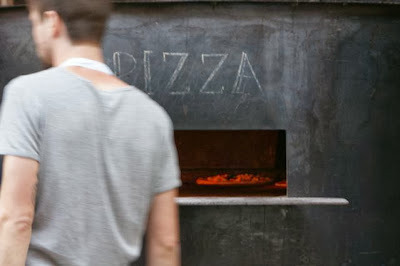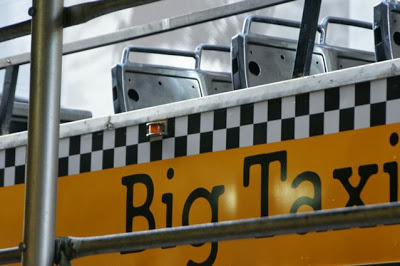Beth Kephart's Blog, page 113
September 20, 2013
Weekend Plans: The Imaginarium of B.F. Spells and The Chestnut Hill Book Festival
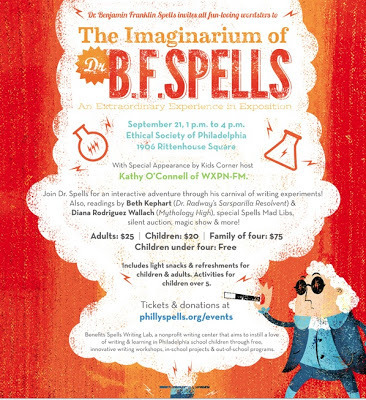
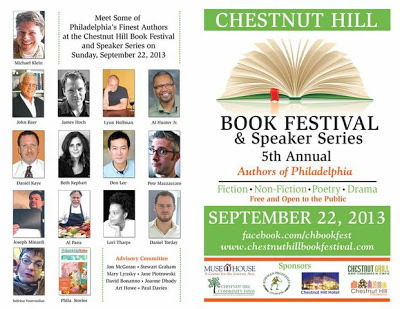
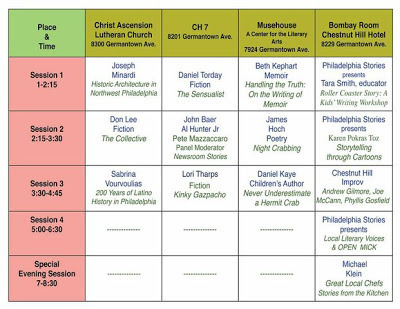
For those of you not headed to the wonderful book festival at the nation's capital, here are some fun Philly events to consider.
First, on September 21, there's The Imaginarium of Dr. B.F. Spells: An Extraordinary Experience in Exposition, happening at the Ethical Society of Philadelphia, Rittenhouse Square and produced by Spells Writing Lab. Details are here. Diane Rodriguez Wallach and Magic and Mad Libs and More, including Dr. Radway. (We like our doctors in Philadelphia.)
Second, check out the Chestnut Hill Book Festival and Speaker Series, happening September 22 (above). Don Lee, Daniel Torday, James Hoch, Lori Tharps, Philadelphia Stories, myself, and others will be in the house. We look forward to seeing you, and details are here.




Published on September 20, 2013 15:00
From the World Trade Tower to Superman: New York City on a Saturday
Published on September 20, 2013 07:05
September 19, 2013
a Handling review, a Handling teleconference, a memoir conference, and introducing Jesmyn Ward and Terry McMillan
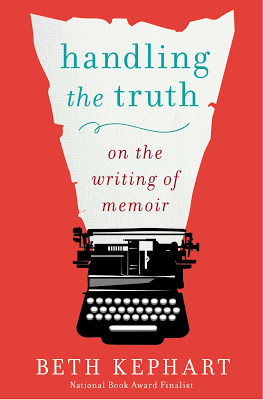
Many thanks to MetroWest Daily News and Rae Padilla Francoeur for this in-depth and considered review of Handling the Truth, which begins like this:
“Handling the Truth: On the Writing of Memoir” by National Book Award
finalist Beth Kephart may seem targeted to the writer of memoir. But the
subtitle is more encompassing. We are right to expand the scope of the
book’s target market to include all students of memoir. Any fan — writer
or reader — is going to appreciate “Handling the Truth,” where many of
our questions are addressed.—Rae Padilla Francoeur
Thank you, Serena Agusto-Cox, for letting me know.
While I'm here, I'd like to share my excitement over two things happening within the next 24 or so hours, and one thing that will happen next month.
First, I'll be at the Free Library of Philadelphia this evening, introducing National Book Award winner Jesmyn Ward and mega-bestseller Terry McMillan—an event that will surely be glorious. Details are here. Join us if you can.
Second, tomorrow I'll be having a tele-conversation with Linda Joy Myers, a memoir expert, writer, teacher, and founder/president of the National Association of Memoir Writers. Linda Joy is a joy—I know this for sure, because of our many conversations, and because she took the time to meet me a few short weeks ago, when I was in Northern California. Here are the details on our forthcoming conversation; we'd love for you to join us.
Third, I know that, once you listen to Linda, you'll be incredibly happy to know that you, too, can meet her in person, when she comes to the Memoir Festival at Rosemont College, on October 20, the details about which are here. I'll be there as well, as well as Robert Waxler and Jerry Waxler.
But first things first. A few words about Linda and tomorrow. Hope to "see" you there.
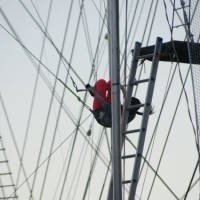
On Friday of this week I’ll be
having a conversation with someone who is very special in the memoir
world—someone all of you know well. Linda Joy Myers didn’t just open her
heart to me when she heard I’d written a book about the making of
memoir, she opened this NAMW world—inviting me into a dialogue,
talking with me about stories and how they get made, arranging for our
teleconference, and turning anticipatory tweets in the art of haiku. In
just a few short days, we will take that conversational leap of faith
and talk to each other about the many things that preoccupy us both in
the making of memoir. How we capture what we love. How we protect those
whom we cherish. Why we cannot write if we do not read, and read widely.
What happens when the truth is bruised, when trust is shattered.
Linda has been teaching memoir for a
very long time to a wide range of people. I have been teaching to small
classrooms of undergraduates at the University of Pennsylvania. We have
so much we’re eager to share, and we hope you will join us.
Not long ago, I was standing near
Fulton Street in New York City, watching the sun go down on the Brooklyn
Bridge. Not far from me were these trapeze artists—or beginning trapeze
artists—daring themselves to take a leap, trusting another to catch
them. That, I thought, is how writing feels. No matter how many books
in, no matter how much we think we know.
We’ll talk about that, too, come Friday.




Published on September 19, 2013 06:44
Fran Lebowitz: on talent, happiness, and changing your mind
Several years ago, in the San Francisco airport, I somehow found myself in conversation with Fran Lebowitz. She'd been out in California giving some talk. I'd been in Oakland, talking Undercover. It was utterly random, could have never been planned, and I wish I'd been a smarter conversational partner.
Last night, thanks to my husband's fiddling with the TV, I noticed this HBO/Martin Scorsese documentary, "Public Speaking," about Fran Lebowitz's life. It's enormously entertaining and one-hundred-percent compelling. It's smart, it's glorious, it's wit.




Published on September 19, 2013 05:41
September 18, 2013
hero of the day

It will all be clear, with just a handful of words.
These words:
Earlier today, just a few hours ago, someone I've never met, never talked to, had barely corresponded with, wrote to apologize about some confusion regarding an event. More of my time would be needed than first suggested. Two days instead of one. Two workshops instead of one. An overnight stay.
It wasn't her fault. It wasn't my fault. The expectation simply hadn't been explained. Oh, I thought. Oh, dear. For I had begun to make promises—to my husband, to myself—that I would begin to do less, not more. That I would find a soulful, peaceful place again. That I would heal a fracturing existence. That I would not go, at least this year, insane. Still, who wants to be ungracious? Who wants to make a stir? Who says no, after saying yes, after making promises?
I didn't have to. I was saved by a stranger, an act of empathy, these words:
Hey--you can still say no, if you feel over-committed and want to cut down. What woman doesn't understand that? We really welcome you to come and speak, but on the other hand, there is plenty of time to still find someone.
If this seems small to you, it is huge to me. A perfect stranger absolved me of guilt. She opened up a door.
She is my hero today. I told her so.




Published on September 18, 2013 15:38
Thank you, Radnor Memorial Library and Friends
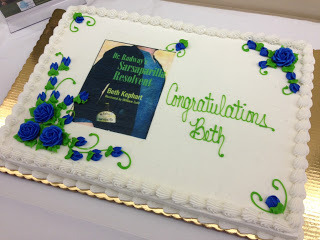
To those who were there, you know how much you mean to me. A family gathering. Friends.
Thank you, as always, Pam and Molly and Radnor Memorial, my true home library.
Thank you, Chris Mills, for the photo.
Thank you, Elizabeth Mosier, for everything.
Love. Me.




Published on September 18, 2013 06:08
September 17, 2013
In Brevity Magazine: On the hunt for memory
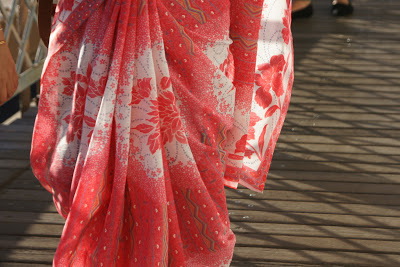
What a gorgeous issue of the always-gorgeous Brevity Magazine is Issue 44/Fall 2013. Essays by Jill Talbot, Cris Mazza, Scott Russell Morris, Lisa Knopp, and so many more. Book reviews. An examination of post-MFA Despair. All here.
I'm also blessed to be included, in this piece about memory—how we run behind and ahead of it, how we work to get near. The piece starts like this, below, and continues here:
Before I sat down to write this essay, I stepped outside and took a walk. Always a walk before I write.
I hadn’t counted on the winds, or the pewter-colored clouds massing
overhead and crowding out the sun. The first drops of rain were a sweet
release from heat. After that, it was an all-out storm—the rain falling
white and thick. I stood beneath the fringe of two tall evergreens to
wait the wild weather out.
Between my feet and the asphalt edge of the street a river began to
run. Five inches high, six inches wide, carrying leaves, broken twigs,
uprooted fists of grass, something silver and manmade. The sudden river
took me back to my childhood and the creek that ran behind my neighbors’
houses. To dark shade and cool moist; bare feet in chocolate muck; to
water striders and tadpoles, my mother calling my brother, sister and me
home.
Thank you, Dinty W. Moore, whom I met long ago and still admire and feel lucky to be remembered by.




Published on September 17, 2013 12:11
September 16, 2013
How does a book get made? Previewing the Dr. Radway Launch, set for tomorrow evening at Radnor Memorial Library
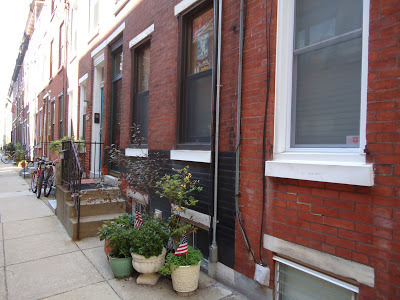
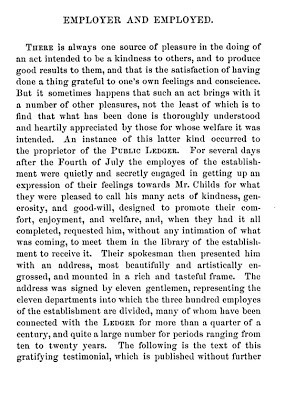
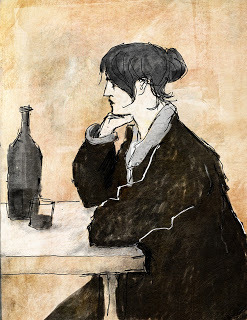
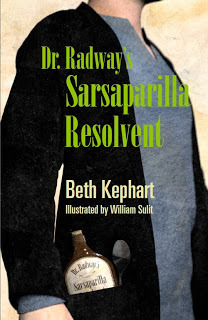
Tomorrow evening—Tuesday, September 17, 7 PM, Radnor Memorial
Library—I will formally launch Dr. Radway's Sarsaparilla Resolvent, a
story of 1871 Philadelphia. The tale of William, a poor boy trying to
rescue his family, emerged from many years of research and reflection,
and I'll piece some of that together through images of then and now. I
will, as well, reflect on the sound of Dr. Radway, and how it differs from the sound of its companion Centennial novel, Dangerous Neighbors.
I hope you will join us.




Published on September 16, 2013 06:02
September 15, 2013
Brooklyn Bridge, Ahead of Sunset, Saturday


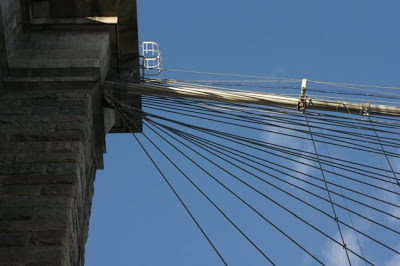

I arrive home from a whirlwind 30 hours in and near New York City. Jersey City. World Trade Center. Brooklyn Bridge (both sides, and the long walk each way). Fulton Street. Jersey City (again). Times Square. Queens. Hoboken. Jersey City.
I want to tell you everything, but I've got a review due, all these handwritten words of 3 AM this morning that must now become something true.
Tomorrow, then.




Published on September 15, 2013 14:01
September 14, 2013
My interview with Ploughshares: Empathy, Delight
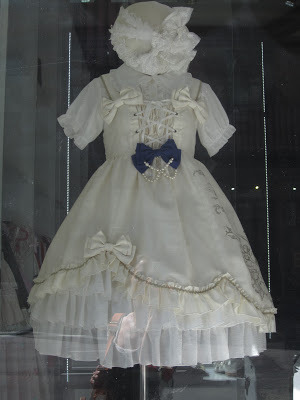
It was a tremendous honor to be interviewed by Erinrose Mager for Ploughshares Literary Magazine not long ago. Her questions were remarkable. She gave me room to answer at length.
And so, rushing off to the Big Apple as I now am, I quicklyshare a conversation that begins like this, below, and can be found in its entirety here:
Apropos of your chapter in Handling the Truth,
“Exercising Empathy,” can you articulate how you underscore the
importance of empathy when teaching writing students? In the classroom,
what texts do you often cite that exercise empathy deftly? Why are these
texts so crucial to understanding empathy as the cornerstone of memoir?
One of the reasons that I love being in a classroom is that we are
endlessly learning empathy from one another. I spend a lot of time in
the early sessions building trust. I require the students to get
engaged—to pay attention to the work that arises from in-class exercises
and to the person doing that work. I require them to notice who is
speaking, and why. We interview one another. We define expectations. We
make psychic and literal room for one another; it’s a very small
classroom. We establish a framework, and a mood, and so we are prepared. We are empathic.
The best writers of memoir demonstrate empathy both for themselves
and for those whom they include in their stories. There are two pages in
Natalie Kusz’s memoir, Road Song, that I read out loud every
year. Kusz was a little girl walking home from school in her new home of
Alaska when she was attacked by tethered huskies. That attack will
define the remainder of her childhood and much of her adolescence as she
succumbs to countless operations to repair her devastated face.
But when Kusz writes about the attack, she writes almost gently,
almost quietly, of the violence. She writes of the mittens she was
wearing:
I watched my mitten come off in his teeth and sail
upward, and it seemed unfair then and very sad that one hand should
freeze all alone; I lifted the second mitten off and threw it away, then
turned my face back again, overtaken suddenly by loneliness.
When I read these words aloud (through tears, always), there is
silence in the room. There is huge respect for a writer who, at that
traumatic moment in her life, cares for the weather, cares for the
mittens, speaks of loneliness, not rage. This is a writer whose entire
book is filled with that kind of concern for other things, and other
people.
Empathy is, according to Merriam-Webster, “the imaginative projection
of a subjective state into an object so that the object appears to be
infused with it.” Kusz projects as she writes. The students project as
they read. And this sort of projection happens in many wonderful
memoirs. I think of Patricia Hampl, Gail Caldwell, Lucy Grealy, Caroline
Knapp, Abigail Thomas. And, by the way, let us not assume that empathy
is a talent reserved for women; read Geoffrey Wolff and Mark Richard and
C.K. Williams and many others, and you’ll find it there.
When a memoirist lets us see her or his world—when she or he evokes
it instead of judges it—we are taught empathy. We are inspired by it.
You explain many wonderful writing exercises in Handling the Truth.
What is one exercise that you turn to, time and again, when teaching
memoir? What is it about this exercise that affects students so deeply?




Published on September 14, 2013 08:41


